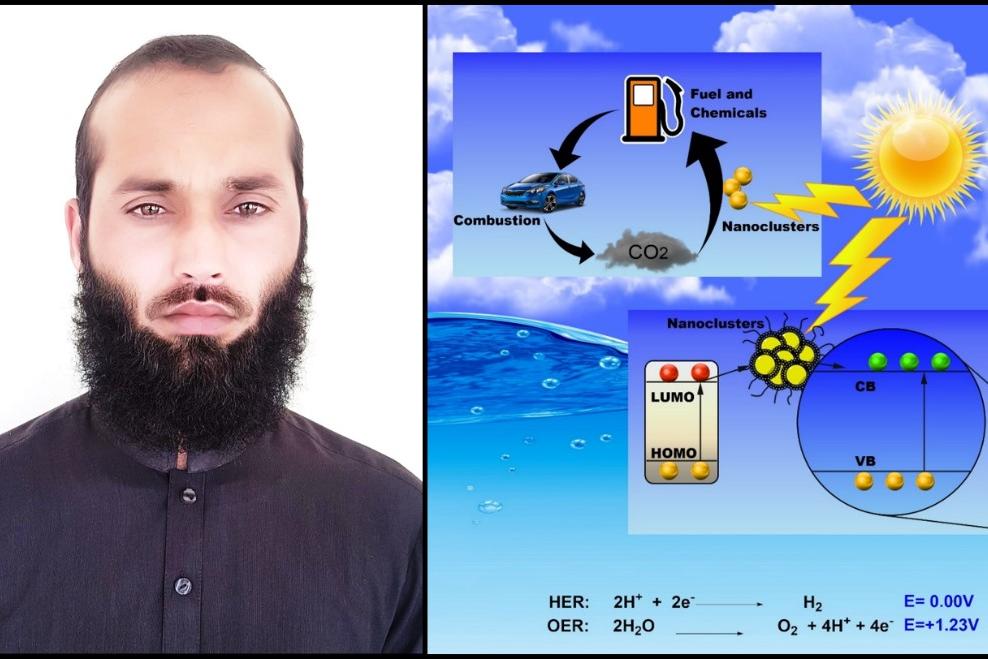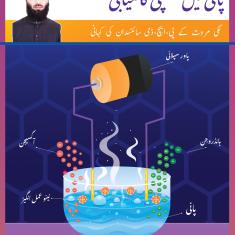
From Laqi Marwat to SBASSE LUMS - the story of Dr Akhtar Munir
Dr Akhtar completed his MPhil and MSc in Major in Inorganic and Analytical Chemistry from Quaid e Azam University before he enrolled in the LUMS SBASSE PhD Chemistry program. His expertise lie in inorganic chemistry, which he pursued while he was studying for his Master’s degree, where he opted for Transition matter complexes as the program major while his minor was in material science. So his academic journey is a very well-curated one where he decided very early on in his life of what he’d like to be working on and pursue as he moves forward. He has always taken every challenge in a stride and has been able to give more than a hundred percent in whatever he does. Dr Akhtar feels, that if one has the clarity of mind and focus in vision, then a person can give full concentration to the subject bearing great results.
Although, before studying at LUMS, Dr Akhtar didn’t follow a specialized path for material chemistry or nanotechnology. His interest in this area piqued as he joined LUMS and found like-minded people who were working in the similar field. That’s where he was drawn in to the charm of material technology and started pursuing this as his main subject for his PhD. He explains Nanomaterials, in principle as, materials of which a single unit small sized between 1 and 100 nm. He understands, that the world has too huge challenges to overcome at the moment, one is the importance of innovation and discovers in health and the other is making sure that we as humans, are using lesser fossil fuels to run the world. The non-renewable energy is something which leaves residues to deal with while it provides us with energy. Plus, in the long run, the human race will be outgrowing the depleting reservoirs and the world will need another sustainable source of energy. Hence, the need to find solutions for such global issues was what kept Dr Akhtar up at night and made him work diligently in finding solutions on the nanoscale. So he went on the crusade to work on exploration of the renewable energy resources, like water, wind and sun. Here he picked up water as his main protagonist and the obvious source of energy. Due to the excessive use of the non-renewable energy (NRE), a lot of unwanted gases have been harming the ozone layer of the planet and resulting in global warming. NRE is used by 90% of the industries globally and has had a negative impact on the environment.
He was fascinated by Dr Irshad’s work in material science and so Akhtar took material science as his main research interest; while his major being inorganic chemistry. Akhtar has always been interested in pure sciences and is the only person from his hometown to have pursued PhD science as his passion project. Dr Akhtar Munir, has made significant progress to develop highly effective nanocatlysts for the production of hydrogen (H2) from a sustainable source i.e., water; as his academic work at LUMS. He worked with Dr Irshad’s group on the synthesis of various transitionary complexities of material science. Akhtar set out to develop transition metals (Cu, Ni and Co) based nanoscale materials decorated on various conducting supports, including functionalized graphene oxide and mesoporous carbon, to electrochemically catalyze the breakage of water molecules to produce hydrogen with high efficiency.
While reminiscing about his experiences at LUMS, Dr Akhtar shares that starting from the first day when his admission test was being taken, he was impressed by the sheer dexterity and systematic efficiency of how the university deals with potential PhD students. He joined LUMS in 2016 and he claims that the past four and half years have been life altering for him not only in education, but also on a personal level. He made friends throughout the school, and found colleagues and professors who understood his passion and hard work and worked with him day and night to achieve what he set out to do. The fact that LUMS admits students strictly on merit and then develops a culture of steadfastness, honesty and diligence in students, is something which Dr Akhtar says has shaped his personality during his time on campus. He appreciates all the help and support which he received from his peers and the especially the faculty who had an open-door policy and would always welcome him if he ever came across any difficulty. Most of his time was split between studying, seeking council of the faculty and untangling administrative matters, and throughout his time, he was met with competent and kind people who helped him every step of the way. He especially applauds Dr Sabieh’s revolutionary steps towards upgrading the SBASSE PhD program to a new level and making every student’s efforts worth it. Back in 2016, Akhtar got accepted in the Quaid e Azam University Islamabad and also the Peking University in China along with getting accepted to LUMS. He preferred LUMS over the other two institutions and claims that this was the best decision which he made in his entire life. He has always been a competitive person and while he was at QAU, the environment was provided to him for productive competition and but when he came to LUMS, he felt as if he has found a family he never knew he wanted in the people here. Dr Akhtar belongs to Lakki Marwat in KPK, and his love affair with chemistry began right after his FSc ended where he feels that a decision was made for him by the universe, that he will be pursuing chemistry as a subject and a source of joy for the foreseeable future. Hence, he earned his bachelors and master degree in this field before continuing with his journey at LUMS. Throughout, he appreciates the support which his family provided him with and the strength and conviction which he found in himself while working with peers, colleagues and faculty throughout his time until he graduated from LUMS.
The research findings of Akhtar Munir have already been published in highly prestigious international journals and can be viewed by clicking the journals name below. He feels extremely blessed to have found the opportunity to showcase his work in global platforms. Impressively, as a first author, Akhtar Munir published a review article in ChemSusChem, and 04 research articles in ChemSusChem, ACS Applied Energy Materials, Electrochimica Acta and Chemistry – A European Journal. As a co-author with other MS/PhD students at LUMS, Akhtar Munir also published research articles in Advanced Functional Materials, ChemCatChem and International Journal of Hydrogen Energy. This original research productivity by PhD students is genuinely outstanding and rarely witnessed in Pakistan, especially keeping in view the quality of journal publications and completely indigenous work done at LUMS.
Dr Akhtar hopes that through his work (current and future) he will be able to make a positive impact by increasing the efficiency of hydrogen as the source of energy and, hence, minimizing the adverse effect on earth. He would like to work in higher education and pursue his research on many other issues which are plaguing us on a global level. He would also like to support the higher education efforts of his hometown in KPK and advance them in management and in research. He would like to collaborate with international researchers in the subject of his interest and produce projects which have a positive impact.


